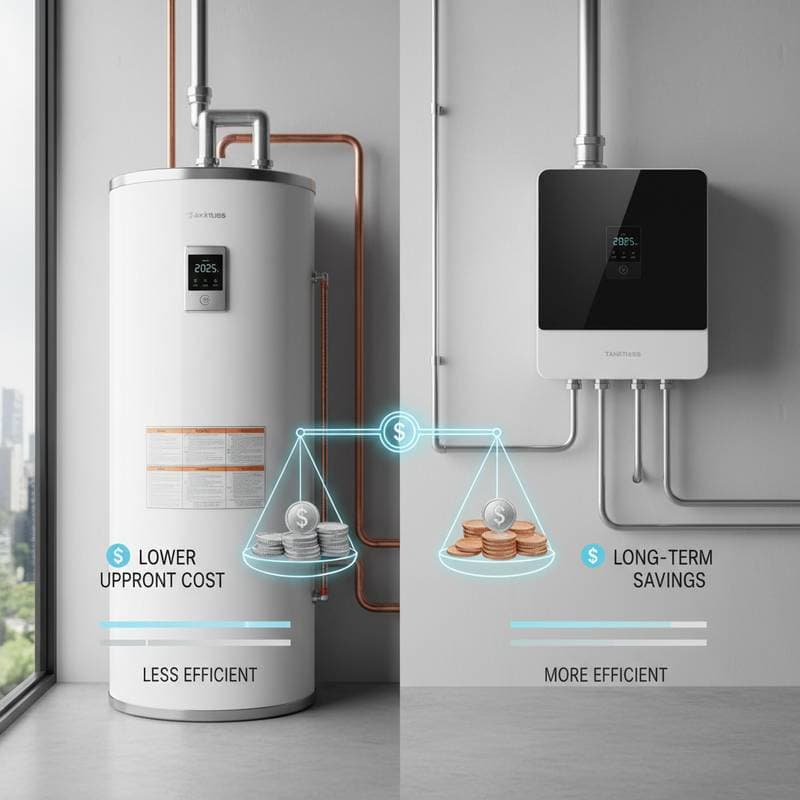Tank vs Tankless Water Heater: 2025 Cost Comparison
Homeowners face a significant choice when selecting between a traditional tank water heater and a tankless model. This decision influences initial expenses as well as ongoing energy bills. By examining differences in installation, performance, and maintenance, individuals can identify the option that best aligns with their needs and budget.
Water Heater Cost Fundamentals
The national average for installing a tank water heater falls between $1,000 and $2,500. Tankless water heaters typically range from $2,500 to $4,500, varying by capacity, fuel type, and setup demands. These figures encompass labor, materials, and necessary permits.
Regional Price Variations
Costs vary considerably by location. In urban coastal regions or high-demand cities, elevated labor rates and permit expenses push prices toward the upper limits. Rural areas or smaller communities often offer savings of up to 20 percent due to reduced labor and energy costs. Regions with inexpensive natural gas make gas models particularly economical.
Seasonal or Cyclical Pricing Fluctuations
Demand peaks in winter, leading to slight price increases. Spring and late summer bring promotions on tankless units as manufacturers introduce new lines and clear stock. Homeowners benefit from timing purchases to capture these deals.
Economic Factors Influencing Service Costs
Fluctuations in material prices, such as copper and steel, directly impact manufacturing expenses. Local regulations on energy efficiency raise production costs, which manufacturers pass to buyers. Rising labor inflation further elevates rates for qualified plumbers.
Pricing Models and Structures
Providers employ diverse pricing approaches based on the service and project scale.
Hourly Rates Versus Flat Fees
Hourly charges for plumbers range from $75 to $150, suitable for minor repairs or partial updates. Full installations prefer flat fees, which include all labor and materials for cost predictability. This method minimizes surprises in billing.
Per Unit or Project-Based Pricing
Many quotes bundle the unit, installation, and old unit removal into a single price. Such packages streamline choices but may obscure differences in materials or labor challenges. Request itemized breakdowns to verify value.
Bundle or Package Pricing Strategies
Packages often incorporate warranties, maintenance, or initial inspections, adding $200 to $500 upfront. These options lower future repair costs and maintain warranty validity. Evaluate long-term savings before committing.
Subscription Versus One-Time Service Costs
Emerging subscription models charge monthly fees for installation, upkeep, and replacements. This evens out expenses but may total more over time than a single payment. Property managers favor subscriptions for consistent budgeting in multi-unit settings.
Service Tiers and Their Price Points
Options span from basic to premium, matching household requirements.
Basic or Essential Services
A 30- to 40-gallon tank water heater installs for $1,000 to $1,500. Entry-level tankless units suit small homes at $2,000 to $2,800. These provide reliable hot water without advanced features.
Standard or Professional Service Pricing
Mid-tier tank models with enhanced insulation and quicker recovery cost $1,500 to $2,200. Standard tankless systems for two or three bathrooms range from $3,000 to $3,800, featuring superior efficiency and controls.
Premium or Comprehensive Service Rates
Hybrid heat pump tank heaters achieve high efficiency at $2,500 to $3,500. Advanced tankless units for large homes with multiple demands exceed $4,500, particularly with gas line or venting upgrades.
Specialized or Bespoke Service Expenses
Integrating tankless systems with radiant heating or smart home tech surpasses $5,000. These require expert modifications to electrical or structural elements.
Key Variables Influencing Water Heater Pricing
Several factors determine the final expense.
Scope or Size of the Project
Assess fixture count, hot water needs, and family size to select appropriately. Compact tanks suffice for apartments, while tankless models handle high-demand family homes.
Complexity and Required Skill Level
Older properties may need new venting or wiring, increasing labor. Certified installers for tankless units command premium rates for precise gas and safety work.
Time Required for Completion
Tank replacements finish in half a day; tankless conversions take a full day or longer. Prolonged efforts raise costs under hourly structures.
Materials or Equipment Needed
Additional items like venting kits or expansion tanks add expenses. Stainless steel venting for gas units costs two to three times more than PVC for electric ones.
Add-On Services and Supplemental Charges
Extra services contribute to the total.
Old Unit Removal Fees
Disposal of the existing heater adds $75 to $200. Certain providers bundle this into flat rates; others bill separately.
Permit and Inspection Costs
Permits for gas or electric work range from $50 to $150 by locality. Compliance ensures safety and avoids fines.
Electrical or Gas Line Modifications
Upgrades for inadequate lines cost $300 to $700. Tankless systems frequently demand larger gas pipes or circuits.
Expedited or Priority Service Rates
Rush jobs inflate labor by 20 to 40 percent. Plan ahead to sidestep these premiums.
Long-Term Cost Considerations
Tank water heaters endure 8 to 12 years; tankless models last 15 to 20 years. Tankless efficiency cuts energy use by up to 30 percent, per U.S. Department of Energy data, recouping initial costs via utility savings.
Annual maintenance, such as flushing tanks or descaling tankless units, costs $100 to $200. Regular care extends life and upholds warranties; neglect accelerates failure.
Choosing the Right Option for Your Home
Match the system to your household dynamics and finances. Tankless units excel for simultaneous high usage, providing endless supply. Tanks offer straightforward affordability for modest needs.
Assessing Value for Long-Term Savings
A strategic water heater upgrade balances cost, efficiency, and durability. Compare quotes from licensed experts, review warranties, and factor in local energy rates. The right choice ensures reliable hot water and controlled bills for years ahead.





